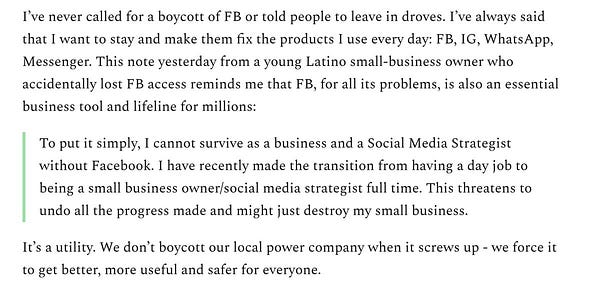Congress isn't ready to regulate social media
We - government, users, the companies themselves - all have a lot of work to do.
Sree’s newsletter is produced w/ Zach Peterson (@zachprague). Oliver Darcy (@oliverdarcy) captures the hypocrisy of Fox News and the Murdochs. I wrote in April 2020 about how history will hold them to account for their role in spreading the pandemic (and nothing has changed since).
Scroll down for Read Something; Watch Something; and a weekly tech tip from Robert S. Anthony (@newyorkbob).
TUNE IN: Our #NYTReadalong this week was w/ Jarrett Adams, a lawyer who was falsely convicted at 17 and exonerated a decade later; and author of “Redeeming Justice” (see recording). Recent episodes: Jeanne Pinder, creator of Clear Health Costs, who spent 23 years at the NYT; Johnette Howard, who collaborated on Billie Jean King’s new bestselling autobiography; Peter Marks, Washington Post chief drama critic #WaPoReadalong; Sarah Maslin Nir, NYT reporter and author. The NYTReadalong is sponsored by Muck Rack.
My Digimentors team is working with companies and nonprofits around the world to create virtual and hybrid events. We’ve worked on events for 50 people and 100,000. See our updated brochure. Don’t cancel or postpone your conference - contact us! sree@sree.net
***
The Senate held a hearing on Facebook and young people last week and, as I wrote last week, it struck me as more of the same song and dance we’ve seen for the last 5 years or so.
It’s overall a good thing that Congress holds these hearings. I know it seems like a glib piece of political theater — and it is exactly that in so many ways — but it’s still elected officials at least getting the company on the record.
You can (and should!) watch the hearing here:
Next week, the whistleblower who leaked a trove of documents to the WSJ that led to all of this will testify before the same committee. The order of events here is strange. Facebook is supposed to be answering for these reports, but the company has been on a PR blitz and was questioned first by Congress. The whistleblower should have been the first to testify, and that seems pretty obvious. I can already hear next week’s questions being framed as responses to things Facebook has said over the last two weeks, and that’s a genuine disservice.
Senators should have questioned the whistleblower first, added even more context to the WSJ series, and then made Facebook answer those claims. And, when I say “Facebook” in this case, I mean Mark Zuckerberg. At this week’s hearing, it was Antigone Davis, Facebook's global head of safety, who was answering questions. We’ve learned by now that it only matters when the founders and/or CEOs are in the hot seat. Every time Congress has held hearings on anything social media-related and questioned policy people or any c-suiter other than the person at the top, it’s been a complete wash.
There were some good, thoughtful questions, and some clear concern from the senators, but I still don’t see what the policy move is here. It’s easy to say, “reform section 230,” but that’s a lengthy, expensive process in practice, and these hearings continue to show that policy makers still don’t know what to do with Facebook and the rest of the social media giants.
One part of that is anonymity. There was a “dunkable” moment from Sen. Blumenthal, but that clip was taken out of context, and he’s actually worked on this stuff before, going so far as to set up a “Finsta” to see the sort of content young people were being shown. There are high-minded reasons to allow for fake identities on social media - political dissidents, people at risk, and others simply need to be able to online and anonymous. But a lot of kids set up fake accounts, too. Sometimes they’re weird, sometimes they’re artsy, sometimes it’s just for a DM group. It’s not all malicious.
This is a good thread on the Finsta space and what it means to a lot of the people who use anonymous accounts for very real-world reasons.


This week, there’s been a lot of coverage of the fallout of the WSJ series by Jeff Horwitz, Georgia Wells and other Journalistas, but this essay by Kate Klonick has the best practical look at what reform might look like.


And if you haven’t seen it, take 13 minutes to watch the new “60 Minutes” segment with Frances Haugen (@FrancesHaugen_), the FB whistleblower who got all this started. FB’s official response: “We continue to make significant improvements to tackle the spread of misinformation and harmful content. To suggest we encourage bad content and do nothing is just not true.”
And, again, my take on why I’m not boycotting FB (something on which Frances Haugen and I apparently agree!):


What do you think? Would love to hear your thoughts.
- Sree
Read Something
Patrick Wyman is very thoughtful in this piece on the modern gentry class in America. It’s interesting to think of influence relative to scale, and I admit to not having thought about it quite like this. Many people point to the millionaires and billionaires who wield so much clout — and, at the upper echelons of power, they do — but, at more local levels, things are a bit different.


TECH TIP: Amazon’s Curious Astro Robot: Should We Trust It?
By Robert S. Anthony
Each week, veteran tech journalist Bob Anthony shares a tech tip you don’t want to miss. Follow him @newyorkbob.
It’s one thing when gadgets make heavy demands on our time or wallets, but sometimes they demand something priceless: Our trust. That’s what Amazon is asking of consumers as it rolls out its newest voice-enabled Alexa device, the Astro rolling robot.
Not only can the $1,000 Astro listen to you, but it can also see you and follow you around if you ask it to. When you’re away it can keep tabs on your home, older relatives or even the cat—who probably won’t appreciate it. The unit looks friendly enough with a swiveling 10.1-inch display which can show electronic “eyes” that can blink and offer other expressions.
By using an app, users can check in on their homes from anywhere with an Internet connection and can even trigger and alarm if they don’t like what they see. A retractable periscope camera can rise as high as 42 inches to get a better view of surroundings. Like floor-sweeping robots, Astro knows where its charging station is and can return to it when it’s low on battery power.
Armed with microphones, cameras, object and motion detectors and speakers, the unit can collect a good deal of data—even in low light with its night-vision LEDs. The screen can display information, photos or videos or be used for teleconferencing. When you first set up the unit, you can provide rooms with names “kitchen” or “living room” and send the Astro there with a push of a button.
When Amazon introduced the Alexa-enabled Echo speaker in 2014, many worried that their privacy would be compromised by a device which was always listening. According to Amazon, no audio is stored by its Alexa-enabled devices or sent to the cloud unless a wake word (usually “Alexa”) is detected or a wake button is pressed.
Seven years later, consumers have learned to trust the little listeners and voice-enabled devices from Amazon, Google, Facebook and others are everywhere—seemingly controlling everything. While the Astro has many possible beneficial uses, the fact that it’s always looking and listening may give some people pause—especially since it comes from Amazon, a corporation very adept at storing and retrieving vast amounts of data.
Amazon wants us to trust a robot that can not only listen but could theoretically keep tabs on our movement patterns and thus—here again theoretically—predict when we eat, watch sports, leave the home, etc. Such data could come in very handy when targeting advertising.
Yes, you can tame or escape Astro by walking up or down stairs (it can’t handle those), setting off-limits boundaries so it knows where it’s not allowed to go, or of course by turning the darn thing off.
But can you trust it? And if you do, can you get one? For now the answer to both is “maybe” since the Astro is currently available by invitation only.
#WorthyThread
Honestly, this is incredible. The effort here is remarkable, and the full body of work is actually incredibly educational in a lot of ways. Most importantly, I now understand at least a dozen memes that I was totally out of the loop on. So much awfulness in this bracket.
Watch Something
I recently interviewed founder, CEO and connector Susan McPherson (@susanmcp1) about her new book, “The Lost Art of Connecting” and I learned so much, including her plan for every in-person event she goes to: Meet three people, share three things, learn three things.
Odds & Ends
🗞 TUNE IN: Our #NYTReadalong this week was w/ Jarrett Adams, a lawyer who was falsely convicted at 17 and exonerated a decade later; and author of “Redeeming Justice” (see recording). Recent episodes: Jeanne Pinder, creator of Clear Health Costs, who spent 23 years at the NYT; Johnette Howard, who collaborated on Billie Jean King’s new bestselling autobiography; Peter Marks, Washington Post chief drama critic #WaPoReadalong; Sarah Maslin Nir, NYT reporter and author. The NYTReadalong is sponsored by Muck Rack.
The NYTReadalong is sponsored by Muck Rack. Interested in sponsorship opportunities? Email sree@digimentors.group and neil@digimentors.group.
The Readalong is followed, on Sundays at 11 am-noon ET, by a medical show I’m co-executive producing with surgeons Sujana Chandrasekhar, M.D. (@DrSujanaENT), and Marina Kurian, M.D. (@MarinaKurian), called She’s On Call (watch live or later). Here’s the Apple Podcasts version.
After 250 episodes in 250 days, my global show has moved to a weekly cadence. The best way to know when I’m on the air and see all my archived shows is to subscribe to my YouTube channel or my Whatsapp alerts.
👀 Did we miss anything? Make a mistake? Do you have an idea for anything we’re up to? Let us know! Let’s collaborate! sree@sree.net









I have been surprised by how many people did not know about the WSJ series. It was like "I don't need/want/care about news about social media."